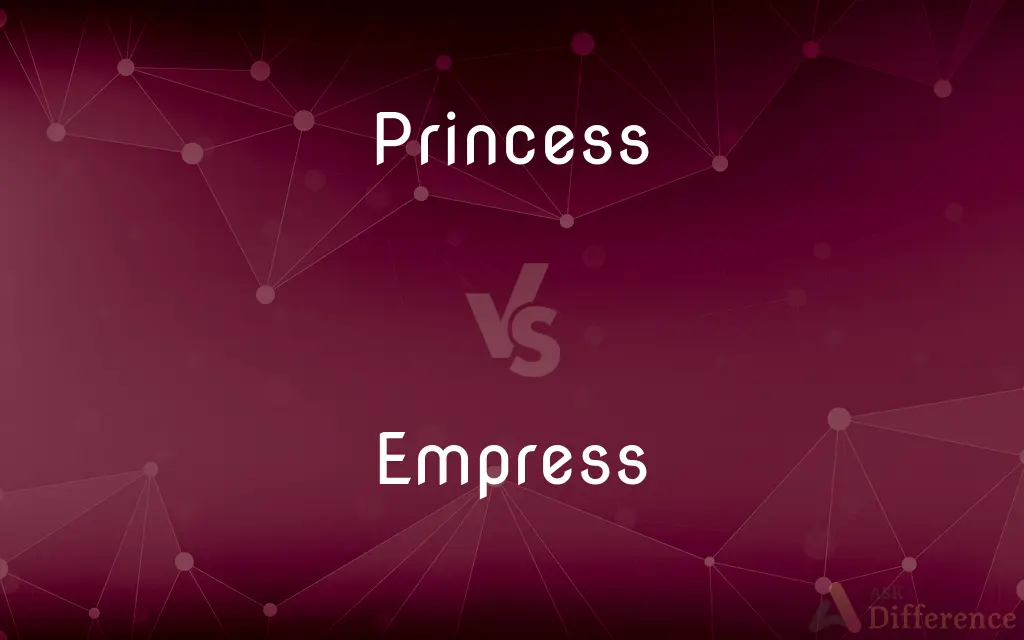Princess vs. Empress — What's the Difference?
By Maham Liaqat & Fiza Rafique — Published on February 29, 2024
A princess is typically a female member of a royal family, often the daughter of a king or queen, while an empress is a female sovereign ruler of an empire or the wife of an emperor, wielding more power and authority.

Difference Between Princess and Empress
Table of Contents
ADVERTISEMENT
Key Differences
A princess, in most royal contexts, is either born into or marries into a royal family, holding a title that signifies her royal status but does not necessarily grant her significant governing power. The role and influence of a princess can vary widely depending on the specific traditions and laws of her royal family, with some princesses taking on ceremonial duties or charitable work.
An empress, on the other hand, is the female equivalent of an emperor, often ruling an empire, which is a vast group of territories and peoples under a single sovereign authority. An empress can either come to power through hereditary succession, marriage, or, in rare cases, personal achievement.
The title of empress carries with it the implication of expansive power and control, often over multiple nations or culturally diverse regions, whereas a princess's influence is generally more limited and can be largely symbolic. While an empress is actively involved in governance and state affairs, a princess's duties are usually less defined and more varied, ranging from supporting the reigning monarch to engaging in philanthropic efforts.
In historical and contemporary contexts, empresses have often played crucial roles in shaping the policies and directions of their empires, while princesses, though sometimes influential in diplomatic or social realms, typically have less direct impact on state governance. The distinction between the two titles reflects not just a difference in the scope of authority but also the nature of their responsibilities and their positions within the hierarchical structure of royalty.
Both titles, however, carry significant cultural and historical weight, embodying the traditions, values, and legacies of their respective royal or imperial families. The roles of princesses and empresses continue to evolve, reflecting changes in societal attitudes toward monarchy, gender, and power.
ADVERTISEMENT
Comparison Chart
Definition
A female royal family member, often the daughter or wife of a king.
A female sovereign ruler of an empire or the wife of an emperor.
Power
Generally holds symbolic or ceremonial power.
Wields sovereign power over an empire, often with significant political authority.
Role
Engages in ceremonial duties, philanthropy, and supports the reigning monarch.
Involved in governance, state affairs, and policy-making of an empire.
Scope
Influence is usually limited to the realm of her own kingdom or principality.
Authority extends over multiple nations or territories within an empire.
Titles
Can vary widely (e.g., Duchess, Countess) depending on the royal house's traditions.
Often singularly titled "Empress," but may also have additional titles reflecting conquered or inherited territories.
Compare with Definitions
Princess
A female member of a royal family, especially a daughter of the monarch.
Princess Diana was known for her humanitarian efforts.
Empress
The female ruler of an empire, or the wife of an emperor, with extensive sovereign authority.
Empress Catherine the Great expanded the Russian Empire significantly.
Princess
May also refer to the wife of a prince.
Upon her marriage, she became a princess of the realm.
Empress
Holds the highest rank in an imperial hierarchy.
As an empress, she presided over the empire's vast administrative structure.
Princess
Titles and roles can vary significantly across different cultures.
In some countries, a princess might actively engage in diplomatic missions.
Empress
Her rule can be marked by significant political and cultural influence.
The empress implemented reforms that modernized the empire.
Princess
The term can also be used metaphorically to describe someone treated with great luxury or delicacy.
She's treated like a princess in her family.
Empress
The title is associated with historical empires like the Roman, Byzantine, and Qing.
The empress ruled over the Byzantine Empire at its zenith.
Princess
Often involved in charitable works and public engagements.
The princess dedicated her time to promoting education for girls.
Empress
In some contexts, can also imply a woman of great power or influence in a particular domain.
She was considered the empress of the fashion industry.
Princess
A woman member of a royal family other than the monarch, especially a daughter of a monarch.
Empress
The wife or widow of an emperor.
Princess
A female member of a royal family other than a queen, especially a daughter or granddaughter of a monarch.
Empress
The female ruler of an empire.
Princess
A woman regarded as having the status or qualities of a princess.
Empress
The female monarch (ruler) of an empire.
Princess
A female prince; a woman having sovereign power, or the rank of a prince.
So excellent a princess as the present queen.
Empress
The wife or widow of an emperor or equated ruler.
Princess
A female member of a royal family other than the queen (especially the daughter of a sovereign)
Empress
A woman Emperor or the wife of an Emperor
Common Curiosities
How does an empress come to power?
An empress can come to power through hereditary succession, marriage to an emperor, or, less commonly, through conquest or election in specific historical or cultural contexts.
Is an empress always the wife of an emperor?
Not necessarily. An empress can also be a sovereign ruler of an empire in her own right, not just the wife of an emperor.
What responsibilities does a princess have?
A princess's responsibilities can include ceremonial duties, charity work, and representing the royal family in public and diplomatic events.
How is an empress addressed?
An empress is usually addressed with titles such as "Her Imperial Majesty," reflecting her high status and authority.
Can a princess become an empress?
Yes, a princess can become an empress if she marries an emperor or if her kingdom expands into an empire and she becomes the sovereign ruler.
What is the difference between a queen and an empress?
A queen rules over a kingdom, which is generally smaller than an empire. An empress has sovereignty over an empire, which may encompass multiple kingdoms or territories.
Are there modern-day empresses?
While most contemporary monarchies are kingdoms rather than empires, there are still titles and roles in certain regions that carry the historical weight of an empress.
Can a princess hold any political power?
Depending on the constitution and laws of her country, a princess might have certain ceremonial roles but typically does not hold significant political power.
Was Empress Wu Zetian a princess before becoming an empress?
Wu Zetian was initially a consort and then an empress consort before proclaiming herself empress regnant of the Zhou dynasty, a unique path to becoming an empress.
Are there fictional empresses and princesses who reflect these roles accurately?
Fictional works often draw on historical and cultural concepts of empresses and princesses, but with creative liberties that may not always reflect their true roles.
What is a crown princess?
A crown princess is the direct heir to the throne, often the eldest daughter of the reigning king or queen, and is expected to become the reigning monarch in the future.
Can a princess inherit the throne in a kingdom?
In many monarchies, a princess can inherit the throne if she is the next in line according to the succession laws, potentially becoming queen.
What historical impacts have empresses had?
Empresses like Catherine the Great and Empress Dowager Cixi have had significant impacts on their empires' expansion, policies, and cultural landscapes.
Do all countries with monarchies have princesses?
Most monarchies have titles equivalent to a princess, but the exact titles and roles can vary widely depending on the country's traditions and laws.
How do princesses and empresses contribute to diplomacy?
Both can play key roles in diplomacy, representing their families or countries in international relations, though an empress might do so with greater authority.
Share Your Discovery

Previous Comparison
Tommy Hilfiger vs. Tommy Jeans
Next Comparison
Accounting Profit vs. Normal ProfitAuthor Spotlight
Written by
Maham LiaqatCo-written by
Fiza RafiqueFiza Rafique is a skilled content writer at AskDifference.com, where she meticulously refines and enhances written pieces. Drawing from her vast editorial expertise, Fiza ensures clarity, accuracy, and precision in every article. Passionate about language, she continually seeks to elevate the quality of content for readers worldwide.














































